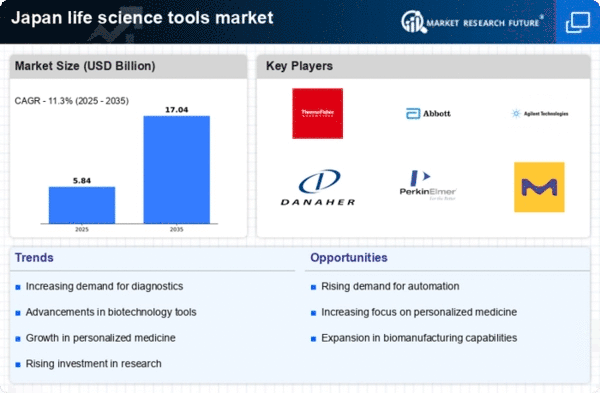Regulatory Framework Enhancements
The regulatory environment in Japan is evolving to support the life science tools market. Recent reforms aim to streamline the approval processes for new technologies, thereby encouraging innovation. The Japanese government is actively working to reduce the time required for regulatory approvals, which is expected to enhance the market's growth potential. By 2025, it is anticipated that these regulatory enhancements will lead to a 20% increase in the number of new life science tools entering the market. This supportive framework is likely to attract both domestic and international players, fostering a competitive landscape that benefits the overall life science-tools market.
Rising Investment in Biotechnology
The life science tools market in Japan is experiencing a surge in investment, particularly in biotechnology. This trend is driven by the increasing demand for innovative solutions in drug development and diagnostics. In 2025, the biotechnology sector in Japan is projected to reach a valuation of approximately $20 billion, reflecting a compound annual growth rate (CAGR) of around 8%. This influx of capital is likely to enhance research capabilities and foster the development of advanced life science tools. Furthermore, government initiatives aimed at promoting biotechnology research are expected to bolster this investment trend, thereby creating a more robust ecosystem for the life science-tools market.
Aging Population and Healthcare Demand
Japan's aging population is a significant driver for the life science tools market. As the demographic shifts towards an older population, there is an increasing demand for healthcare solutions that cater to age-related diseases. By 2025, it is estimated that over 30% of Japan's population will be aged 65 and above, leading to a heightened need for diagnostic tools and therapeutic solutions. This demographic trend is likely to stimulate growth in the life science-tools market, as healthcare providers seek advanced tools to improve patient outcomes and manage chronic conditions effectively. The focus on elderly care is expected to drive innovation and investment in this sector.
Collaboration Between Academia and Industry
The life science tools market in Japan is benefiting from enhanced collaboration between academic institutions and industry players. This synergy is fostering innovation and accelerating the development of new technologies. Universities and research institutes are increasingly partnering with biotech firms to translate research findings into practical applications. In 2025, it is anticipated that such collaborations will lead to the introduction of at least 15 new life science tools annually, significantly impacting the market landscape. This collaborative approach not only enhances the research capabilities but also ensures that the life science-tools market remains at the forefront of technological advancements.
Increased Focus on Research and Development
Research and development (R&D) activities are intensifying within the life science tools market in Japan. Companies are allocating more resources to R&D to stay competitive and meet the evolving needs of the healthcare sector. In 2025, R&D spending in the life sciences is projected to exceed $5 billion, reflecting a commitment to innovation. This increased focus on R&D is likely to result in the development of cutting-edge tools that improve efficiency and accuracy in research and diagnostics. As a result, the life science-tools market is expected to witness significant advancements, driven by the continuous pursuit of excellence in scientific research.
















